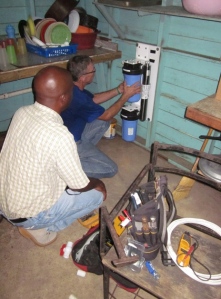Biology
WKU group makes progress on projects to assist remote village in Belize
- Thursday, November 1st, 2012
A WKU group led by Dr. Bernie Strenecky, Scholar-in-Residence in the Honors College and founder of The $100 Solution™, traveled to Belize in September to work in the remote village of Gales Point, Manatee, located near the eastern coast.
The team also included Dr. Jason Polk, Associate Director of Science for the Hoffman Environmental Research Institute; Jonathan Oglesby, WKU Geography and Geology graduate student and Hoffman staff member; AJ Strenecky of the Merritt Island Florida Rotary Club; and Dr. Beth Quick, Dr. Terry Silver and Professor Ruby Black, faculty members from the University of Tennessee-Martin.

AJ Strenecky shows Anthony Flowers from the Ministry of Health how to check the filters on the UV water system installed at the local school in Gales Point prior to testing the system.
The group had several goals during the trip, with the overarching theme of working with the local community in Gales Point. These goals included helping to improve its water supply, discussing and evaluating the school’s curriculum, and evaluating the karst geology and groundwater resources in the area. In addition, Dr. Polk and Oglesby conducted fieldwork in western Belize for a project investigating past climate change impacts on the Maya using cave deposits.
“This trip was magic and is a testament to what can happen when a small number of people give of their hearts, minds and skills to improve the lives of a forgotten people,” Dr. Strenecky said.
Gales Point, Manatee, exists as an isolated community on a peninsula a few miles long and up to only a few hundred feet wide at some points. The peninsula is surrounded by a brackish lagoon just inland from the Caribbean Sea, yet offers little in the way of viable water resources due to its low elevation and karst geology. The primary means of reaching the community is by boat, and the secondary, less-reliable route is via a long, muddy gravel road that can be impassable at times, thus enhancing the difficulty of the community in accessing outside assistance and resources.
The population at Gales Point is made up of a unique people group that originated from runaway slaves and settlers from Nigeria who began inhabiting the peninsula in the early 1800s. Gales Point is one of the few, if not only, places in the world outside of Africa where this culture and its customs still exist and flourish. In addition to the unique population residing in Gales Point, the landscape that comprises the area is a national wildlife preserve, home to many diverse, and sometimes endangered, species of animals and plants, caves, and past Maya activity. The surrounding lagoon is home to multiple threatened or endangered species, including the hawksbill turtle, the goliath grouper, the West Indian manatee, and several exotic bird species.
The trip left little down time, with the group immediately starting on the night of arrival to work on the first major project of installing a UV water filtration and purification system for the local school and preschool. This system was provided by the generous donation of the Merritt Island Rotary Club and pioneered by AJ Strenecky, who spent more than two years in researching, developing and organizing the purchase and installation of the system.
The system incorporates two filters to remove particulates, and an ultraviolet light tube that kills any harmful pathogens, leaving the water purified as it exits the small and efficient system, which is capable of treating three gallons of water per minute. The system now provides clean water for the entire school and preschool on a continuous basis, requiring little energy and maintenance for its long-term operation.

Community members of Gales Point celebrate fresh, clean water from the newly installed UV water system.
The team worked with local Chairman of the Water Board, Kevin Andrewin, and community members to install the system and provide training on its operation and upkeep.
Community leader Nancy Bailey, who owns Manatee Lodge located at the end of the peninsula, is working to develop and implement best management practices with support from the WKU team to help Gales Point become sustainable with respect to water, energy and health. “I am really excited to see the things fall in place that I’ve been dreaming about for years,” she said. “I look forward to continue working with the WKU team and I know great things can and will come out of it.”
The WKU team met with Anthony Flowers from the Ministry of Health (Water Division) and Martin Lewis from the Ministry of Rural Development to discuss issues of water quality and sustainable development. Efforts are under way to develop training initiatives and programs to improve water quality testing procedures and local water infrastructure in rural communities. The Gales Point community serves as a pilot project in the joint efforts.
The WKU team also had a follow-up meeting with the Caribbean Community Climate Change Centre (CCCCC) to continue discussions on how to address climate change issues in the region, including Gales Point. This meeting was part of an ongoing collaboration to build partnerships between WKU and the CCCCC for long-term climate change science and education initiatives in vulnerable Caribbean communities.
Dr. Polk and Oglesby also performed reconnaissance and collected preliminary data regarding the environmental conditions and resources in Gales Point. They visited Ben Loman’s cave across the lagoon and inventoried features within the cave, which included many flora and faun
Some of the links on this page may require additional software to view.


